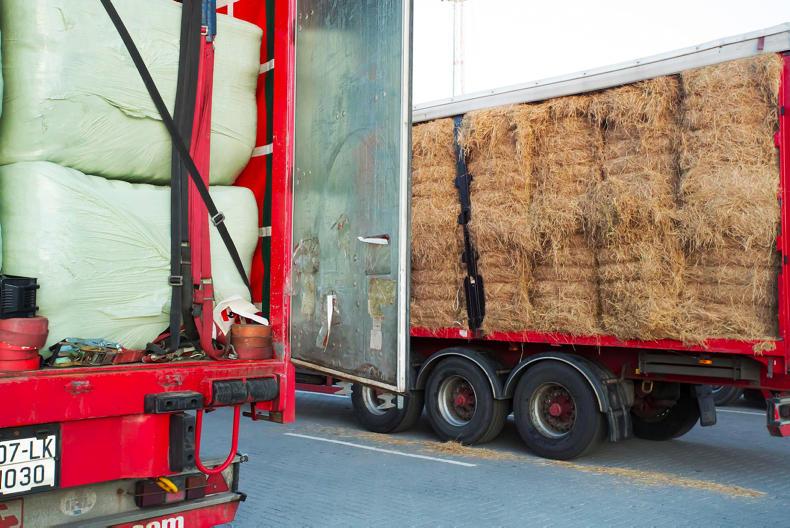Co-ops in the south and south-east of the country have begun importing fodder for suppliers facing winter deficits.
Kerry Group has said some farms are dealing with severe deficits, particularly in the Limerick area.
Five to six loads of fodder are being imported every week from the UK. To date, 1,500t has been imported, half of which is wholecrop wheat and half grass silage.
A spokesperson for Kerry said: “[The] bales cost €60 and are 700kg at 35% dry matter. We’re delivering loads directly to farms, with most receiving 28t in a load.”
Dairygold
Over the last week Dairygold has received its first consignments of alfalfa from Italy as part of its ongoing import efforts.
Fodder will be sold to members at cost price, with an average bale size of 7x4x3 and an average weight of 800kg.
The fodder is currently being distributed to farmers who have an immediate requirement and to those who had identified winter feed shortfalls in fodder budgets.
Glanbia
Glanbia has also imported alfalfa and it will be available to suppliers between now and next spring.
A Glanbia spokesperson said grass growth recovery in most of its catchment area had led to extra conserved fodder resulting in a drop in demand for imported forage crops.
Cork
Among the Cork co-ops, Barryroe has agreements in place to import straw, with 25% of suppliers saying they require extra supplies.
Lisavaird is also in the process of sourcing straw.
Bandon Co-op has imported some Lucerne pellets at 17% protein. The co-op says a total of nine tonnes will be imported by December.
In terms of fodder, most suppliers across the three co-ops above as well as those who supply Drinagh feel they are in a decent position for the winter ahead.
Read more
UK government monitoring Irish fodder imports
Co-ops in the south and south-east of the country have begun importing fodder for suppliers facing winter deficits.
Kerry Group has said some farms are dealing with severe deficits, particularly in the Limerick area.
Five to six loads of fodder are being imported every week from the UK. To date, 1,500t has been imported, half of which is wholecrop wheat and half grass silage.
A spokesperson for Kerry said: “[The] bales cost €60 and are 700kg at 35% dry matter. We’re delivering loads directly to farms, with most receiving 28t in a load.”
Dairygold
Over the last week Dairygold has received its first consignments of alfalfa from Italy as part of its ongoing import efforts.
Fodder will be sold to members at cost price, with an average bale size of 7x4x3 and an average weight of 800kg.
The fodder is currently being distributed to farmers who have an immediate requirement and to those who had identified winter feed shortfalls in fodder budgets.
Glanbia
Glanbia has also imported alfalfa and it will be available to suppliers between now and next spring.
A Glanbia spokesperson said grass growth recovery in most of its catchment area had led to extra conserved fodder resulting in a drop in demand for imported forage crops.
Cork
Among the Cork co-ops, Barryroe has agreements in place to import straw, with 25% of suppliers saying they require extra supplies.
Lisavaird is also in the process of sourcing straw.
Bandon Co-op has imported some Lucerne pellets at 17% protein. The co-op says a total of nine tonnes will be imported by December.
In terms of fodder, most suppliers across the three co-ops above as well as those who supply Drinagh feel they are in a decent position for the winter ahead.
Read more
UK government monitoring Irish fodder imports






 This is a subscriber-only article
This is a subscriber-only article










SHARING OPTIONS: